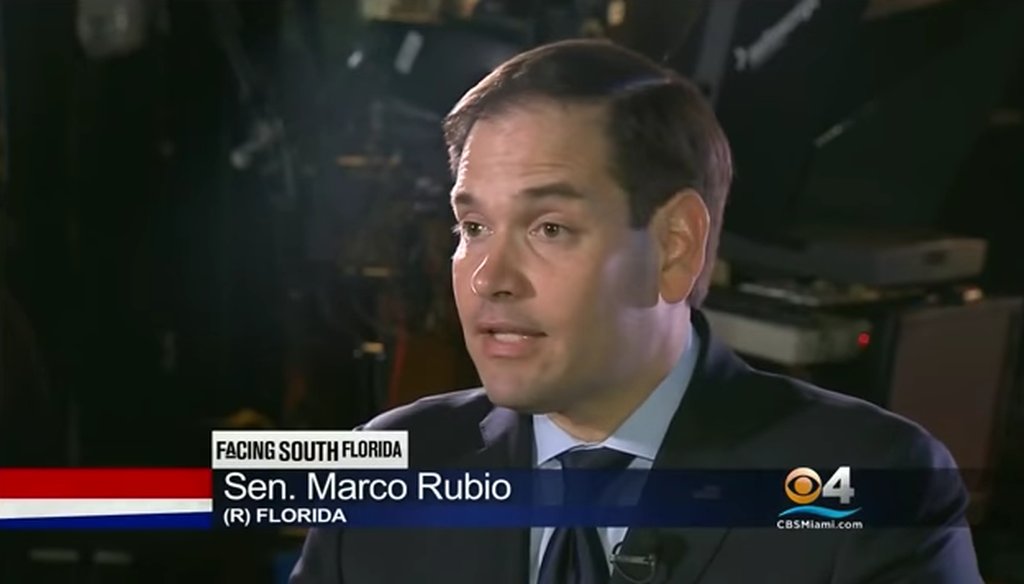Stand up for the facts!
Our only agenda is to publish the truth so you can be an informed participant in democracy.
We need your help.
I would like to contribute

U.S. Sen. Marco Rubio criticized the Iran nuclear deal in an interview on CBS4 Miami April 23, 2017.
U.S. Sen. Marco Rubio bashed the Iran nuclear deal reached by the Obama administration several different times in a recent interview.
Rubio told CBS4 Miami’s Jim DeFede that the agreement, which President Donald Trump pledged to renegotiate, will not do what U.S. officials had in mind.
"You have to look at the deal and say, does this deal prevent what we don’t want? And that is a nuclear Iran. And I believe it will not," Rubio said in the April 23 interview.
Rubio made three assertions about the deal’s flaws that caught our ear:
• The deal allows Iran to ultimately "retain enrichment and reprocessing capability;"
• The deal "did not touch" long-range missiles that could be used to launch bombs against the United States;
• And Iran could still become a "nuclear-capable state."
Is it really so easy, as Rubio made it sound, for Iran to develop a bomb even with the nuclear pact?
Related coverage: Fact-checking Rubio’s criticism on inspections and his false claim about what the deal means for the U.S.-Israel relationship.
Three of five experts who reviewed Rubio’s comments thought they were misleading, while two basically agreed with the senator.
Instead of putting Rubio’s speculative statements on the Truth-O-Meter, we decided to address them with added context and expert opinion.
‘What it does is ultimately allow them to retain enrichment and reprocessing capability, so ... the equipment’s the same equipment.’
The words "enrichment" and "reprocessing" are nuclear-weapon jargon for the process to make a bomb.
Under the deal’s terms, Iran has to curb nuclear technologies and allow nuclear-weapons inspections for 10 to 25 years. Iran also had to give up 97 percent of its enriched uranium stockpile and most of its centrifuges, which could be used to enrich more uranium.
Critics including Rubio have pointed out that Iran’s capability to enrich more uranium is not gone entirely.
But it wouldn’t be as easy as Rubio makes it sound, and some of the deal’s provisions carry beyond the deal’s time limits, said Harvard professor Matthew Bunn, who advised the federal government on weapons during Bill Clinton’s presidency.
The Iran nuclear deal effectively blocked Iran’s path to a plutonium bomb for many years to come and made the uranium path much more difficult by cutting Iran’s centrifuge infrastructure by two-thirds, he said.
The deal also cut Iran’s enriched uranium stock by over 90 percent and delayed the development of more advanced centrifuges, Bunn said.
"The agreement also includes a ban on the key activities involved in getting ready to actually use nuclear material in a bomb, often called ‘weaponization,’ " Bunn said. "While the enrichment restraints expire over 10-15 years after the deal entered into force, the expanded verification and the weaponization ban last indefinitely."
In spite of those limits, there is a valid concern about "P1 centrifuges," machines used to enrich uranium, said Michael Rubin, an American Enterprise Institute scholar who was an adviser on Iran and Iraq for the Office of the Secretary of Defense during President George W. Bush’s tenure.
The deal allows Iran to maintain more P1 centrifuges than Pakistan had when it built its nuclear arsenal. (Rubin said loosely speaking to think of P1 or P2 centrifuges in the same way you think of 2G, 3G, 4G phone technology.)
‘The deal did not touch the long-range missiles.’
Rubio is correct that the deal does not limit Iran’s missile programs. Why not?
Negotiators feared that pursuing missiles could impede the overarching goal of slowing Iran’s nuclear program.
The U.N. resolution approving the agreement called on Iran not to test nuclear capable missiles, but that was informal.
However, Emma Ashford, a research scholar at the libertarian Cato Institute, said Rubio is taking a worst-case scenario as an imminent reality.
"Rubio dramatically understates the difficulties of developing a bomb, and then successfully miniaturizing it to place on an intercontinental ballistic missile," she said. (Rubio’s spokesman pointed out that Cato has received funding from the Ploughshares Fund, an organization that backed the deal.)
Also, U.N. restrictions on arms transfers to Iran, particularly associated with missile technology, remain in place, which will make it harder for Iran to build up its military, including buying missile technology.
It takes many test flights to perfect the ability to bring a nuclear warhead on top of a long-range ballistic missile.
"If they started trying we would know many years in advance," said Daryl Kimball, executive director of the Arms Control Association.
That isn’t a universal view. Rubin described Iran's missile program as already "quite significant." Iran has a history of testing missiles, including shortly after Trump took office.
"They have launched satellites successfully, which is the basic technology needed for a long-range missile," he said.
‘The bomb design is the easiest part. Once you have the design, once you prove that you have that capability, you are a nuclear-capable state.’
To Rubio, once Iran enriches uranium -- coupled with the fact that its missile program wasn’t shut down -- there is a threat of the country using nuclear weapons.
The goal of the agreement was to delay Iran’s capability of building nuclear weapons -- it doesn’t guarantee it will never happen.
Combined, the elements of the agreement restrict Iran’s nuclear weapons potential, Kimball said.
"What that means is that Iran does not have the capacity — and will not have the capacity for at least 12 years — to be able produce enough highly enriched uranium for even one nuclear device in any less than a year," he said, "and it is and will remain under such tight surveillance that any effort to do so would be detected within days, or at worst, within weeks."
James Phillips, a senior research fellow for Middle Eastern affairs at the Heritage Foundation, said that the agreement was a "diplomatic speed bump that delays but does not halt the Iranian nuclear program."
It might, however, buy some time.
"The real question now is how do we use the 10-15 years of greatly reduced risk that the Iran deal is likely to buy for the international community to reduce the risks once the enrichment restraints expire?" Bunn said.
Our Sources
CBS4 Miami, "Facing South Florida: One-On-One With Sen. Marco Rubio," April 23, 2017
Harvard Kennedy School Belfer Center for Science and International Affairs, "The Iran nuclear deal: a definitive guide," August 2015
CATO Institute, "Cato Scholars Warn against Iran War on Speaking Tour," September/October 2007
Heritage Foundation commentary by James Phillips, "The Iran deal: A diplomatic speed hump," July 22, 2015
United Nations Security Council, Resolution 2231, 2015
NPR, "Obama: Iran Will Face Longer 'Breakout Time,' Though Not Indefinitely," Aug. 11, 2015
NPR, "Did Iran's Ballistic Missile Test Violate A U.N. Resolution?" Feb. 3, 2017
AP, "Group that helped sell Iran nuke deal also funded media," May 20, 2016
New York Times, "Iran Launches a Missile, Testing Trump’s Vows of Strict Enforcement," Jan. 30, 2017
PolitiFact’s Trump-O-Meter, "Mixed messages on Iran, but tangible moves toward reversal haven't happened yet," April 20, 2017
PolitiFact,"PolitiFact Sheet: 6 things to know about the Iran nuclear deal" Sept. 8, 2015
PolitiFact, "Iran nuclear deal was Hillary Clinton's, and it 'lined the pockets' of Iran with Americans' money?" July 29, 2016
PolitiFact, "Deal allows Iran to produce nuclear weapon, U.S. Senate candidate Carlos Beruff says" July 29, 2016
PolitiFact, "Marco Rubio says Iran deal breaks ‘anytime, anywhere’ inspection promise by Barack Obama," July 19, 2015
PolitiFact, "North Korea's missile testing and development has increased 'twenty-fold' says Sen. Richard Burr," April 24, 2017
Interview, Daryl Kimball, executive director of the Arms Control Association, April 24, 2017
Interview, Matthew Bunn, nuclear specialist at the Harvard Kennedy School, April 24, 2017
Interview, Emma Ashford, Cato Institute research scholar, April 24, 2017
Interview, Matt Wolking, U.S. Sen. Marco Rubio spokesman, April 25, 2017
Interview, Michael Rubin, American Enterprise Institute resident scholar and former Pentagon official, April 25, 2017
Interview, James Phillips, Heritage Foundation Senior Research Fellow for Middle Eastern Affairs, April 25, 2017












































